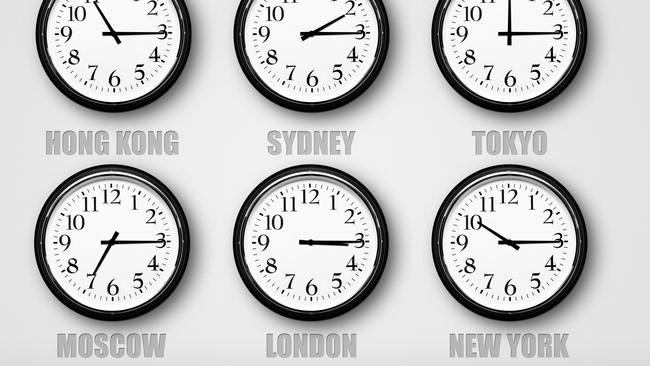Tempus fugit: how tech changed our sense of time
One of the things we’ve given up, handed over to the tech in our pockets, is an awareness of time. Remember how we used to do it?

“At the third stroke, it will be…” How many Australians under the age of 45 would pick this as the talking clock, the dial-up authority for more than 60 years? It was decommissioned two years ago. Time and technology have moved on: why use the phone to access a pre-recorded announcement of the time – down to the last second, beep, beep, beep – when it’s right there, displayed on your mobile phone?
Time hasn’t always been as accessible as it is today. Before the 1990s and the rise of the mobile phone (even early versions came with a time display) the talking clock, with its plummy male voice, reigned supreme as the ordinary citizen’s ultimate guide to the time for the last half of the 20th century. Other dispensers of precise time were either the communal clock tower that rose above the town hall or the workplace hooter signalling the start or finish of the working day. Oh, for the times when a day’s work had a starting point and an end. And for the times when knowing the precise time required a phone call as opposed to a glance. There were minutes of freedom in not knowing the exact time.
The landline has gone the way of the talking clock, too. I can recall my old landline number from years ago but I don’t know my kids’ telephone numbers today. My phone does. (I wonder what happens to old landline numbers. Does the service provider hold my landline number in my name in perpetuity? So that it forever waits, forlornly, like Miss Havisham in Great Expectations, for me to return? Or are old landline numbers polished up and repurposed for someone else’s exclusive use? I am tempted to call my old number and find out but I fear a much younger me would answer.)
The minutiae of the way we live our lives have changed. We no longer need to be reminded of the time of day or to recall phone numbers, postal addresses or postcodes. All that has been outsourced to the digital world. Even email addresses are only loosely known; we start typing and then follow the prompts. No need to fill valuable memory space with such ephemera; surely this leaves space for life’s more important contemplations.
Even the act of navigating the city has been outsourced to technology. There was a time when I could navigate my way around any city with the barest of maps, and I would enjoy the challenge. But today, why bother? Just enter the destination and follow the prompts. And now that mobile phones have calculators, spell-checks, reminder notifications and even Google, there is less need to develop arithmetic, spelling and memory capabilities.
So what are we doing with all the memory space that has been freed up by outsourcing these daily details to technology? Are we more productive, caring, reflective, engaged? Are we living a better life? Or have we merely filled this space with work, aimless scrolling and the one-dimensional relationships of social media?
Without universal access to the internet and the phone network in our pocket, we would now struggle to connect, work and function as a community. It’s a scenario we never seriously contemplated (but neither did we seriously contemplate a global pandemic).
We should always be looking to improve productivity, including via technology. But what constructive skills are we developing to offset those outsourced to technology? A focus on social justice seems evident but we need more. Everyday technology has the capacity to ensure our collective efforts are directed at improving the quality of life for all. I am hopeful that eventually that is where all this digital transformation is headed.




To join the conversation, please log in. Don't have an account? Register
Join the conversation, you are commenting as Logout